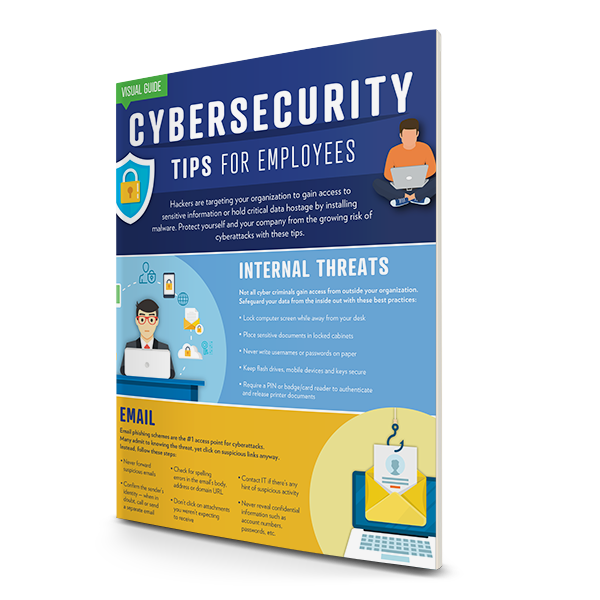The need for secure and accessible data has skyrocketed, driven by the transition to work-from-home and hybrid work models. When deciding where and how data is stored, the first consideration is often cost.
With about one-third of cloud spend being wasted every year by organizations, it’s important to weigh the costs of both cloud storage and on-premise servers to evaluate which is the better value, along with other pros and cons.
While on-premise servers allow for more control over the data and the ability to add as much security as necessary, the convenience, support and low start-up costs of cloud computing storage cannot be ignored. Let’s take a closer look at the various aspects of cloud vs. on-premise costs.
Initial Cost
Deciding between the cloud and on-premise data storage has often been compared to the rent vs. buy decision. With the cost of hardware, power consumption and physical space needed to implement on-premise storage, a cloud solution is far less of an initial financial investment. This is especially true for businesses with smaller data needs. That said, if on premise is best for your business, Elevity offers HAAS and leasing options to reduce this pain point.
What’s often not considered is the ramp up time of implementing on-site data storage solutions. It’s not uncommon for it to take months to fully integrate a new server and prepare to go live. The disruptions and labor costs can be significant. Hiring experts like Elevity would significantly reduce this implementation time.
| Cloud Startup Costs |
On-Premise Startup Costs |
Maintenance
Another factor to consider when deciding between cloud services and an on-premise system is the monthly maintenance costs. With cloud services, you are charged a set fee every month, like a subscription, that will aid in future budgeting. Elevity also offers flat monthly fee maintenance programs to our fully managed clients. With monthly maintenance, the provider is responsible for upgrading its technology and keeping systems up to date with the latest security protocols, upgrades and advances.
With on-premise servers, monthly costs are often limited to electricity, IT and management. But systems must be upgraded regularly to ensure optimal performance and reliability. With the variety of systems available, the cost of repairing or upgrading a server can vary considerably. If you don’t have a managed service provider, you may incur additional costs if not in a fully managed program from a reputable MSP like Elevity.
Because of the expense, it’s not uncommon to see some companies pushing their hardware beyond its recommended lifespan, which can lead to significant business risks. Not properly maintaining on-site servers could lead to costly operational downtime and loss of data if a security breach were to occur. Such an unexpected event could mean you won’t be able to access your files, either temporarily or permanently.
With a cloud service provider, server maintenance and upgrade costs fall on the service provider—not you. And the security measures taken by cloud providers are much more advanced than the majority of those with on-premise servers.
| Cloud Maintenance |
On-Premise Maintenance |
Storage
A big reason moving to the cloud may be a cheaper data management system than an on-premise server, or vice versa, is the amount of data you need stored. Many cloud services offer free storage that range from 5GB to 15GB, and most organizations already own over 1TB of free storage with their current O365 subscriptions that go under utilized. Unless several TB or Petabytes of storage is needed, the higher cost of on-site data servers and storage devices most likely won’t be required.
| Cloud Storage |
On-Premise Storage |
Scaling Storage Capabilities
As your business scales, your need for data will scale with it. If your organization needs to increase its data storage, the cloud is the easiest, least expensive and fastest type of storage.
To store more data with on-premise solutions, more internal hard drives may need to be purchased and you run the risk of running out of slots for those drives, requiring a whole new server chassis to be purchased. This stair-step type of investment can be quite costly compared to a consumption based cloud storage approach, where you can elastically pay for what you need. With many cloud providers you can give back storage space once it’s no longer needed. You can't give back a hard drive after you installed it.
| Cloud Scalability |
On-Premise Scalability |
Total Cost of Ownership
With so many things to consider, a total cost of ownership calculator is a great tool to help determine which data storage system is the more cost-effective option for your organization. The calculator lets you easily compare the overall cost against disk type, amount of RAM needed, storage environment and outbound bandwidth.
Ultimately, cloud systems are cheaper in start-up costs, maintenance costs and support costs; however, the exact figure depends on the amount of data needed to be stored.
|
Total Cost of Ownership |
There is no cut-and-dried answer to which system will be most cost-effective because each organization is different and has different needs. To decide what data storage system is ultimately best for you, talk with a professional who can help you identify and prioritize your data management needs. They’ll work closely with you to develop a plan suited for your organization.
Contact an expert at Elevity for an introductory consultation to review your current storage and identify potential improvements and options, like Microsoft Azure and others. From there, you can determine whether a more exhaustive review of your technology environment is in order.





%20cropped.jpg)





